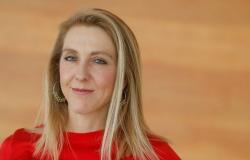IThey have been installed since September and October 2023, in organic market gardening, on a plot dedicated to Magescq, Tinga area. Although they don’t really make a living from their crops yet, they learn a little more every day about being a farmer. Enzo and Roxane arrived in the Landes after a first market gardening experience in New Zealand. Laura and Pascal arrived a month later, she sold textiles on the market and he was a farm worker.
Each couple has 1.5 hectares, with 600 square meters of greenhouse and two tunnels for storage, equipment and tools. So of course, this first winter of support renewable over three years was above all an opportunity to acquire some certainty about their future projects: “We had to prepare for this first season, but frankly, these first months have reassured us in the choices that were ours when signing for this system,” they say in unison.
Sabine Dauga, project manager at the Department, listens to Laura, Pascal and Roxane present their project to the students of the Oeyreluy high school.
A.B.
On the occasion of an open day for future project leaders, in particular students from the Oeyreluy agricultural high school, all the partners of the system met for a field visit: Chamber of Agriculture, Agrobio 40, the Federation of cooperatives for the use of agricultural equipment (Cuma), Maremne Adour South Coast (Macs) and the Department. The apprentice market gardeners were able to share their ideas, their difficulties or the means to develop the support for future beneficiaries.
Already looking for agricultural land
Because if the system is renewable, after three years, it will have to be replaced. This winter, there was not too much water, despite the risk of the water table rising on these plots. “Three years ago, Guillaume, our predecessor, had a flooded greenhouse, which showed us where we should or should not put things during the winter. We started slowly with garlic, and then we switched to the production of summer vegetables,” explains Enzo.
And the tomato plants under their greenhouse are already a pleasure to see. “We chose Paoline, which we planted in mid-April, we also ordered plants for eggplants and peppers. Everything else, we make our plants ourselves,” explains Roxane.
A.B.
Cyril Gayssot, for the Department, and Philippe Sardeluc, for Macs, defended the development of a short-circuit sector for students and schools and seniors in the region.
“We sell a little at the Lit-et-Mixe market,” explains Enzo. Laura and Pascal rather near Saint-Geours-de-Maremne. They share equipment made available by the Cuma, they share a Siret number, but each has chosen to develop their network in one direction. Pascal and Laura, from their Facebook page Rêv’de terre, offer to place an order, pick up your vegetables on site, even pick with them, or deliver on the way.
“We are in Saint-Vincent-de-Tyrosse, so we can also deliver baskets around,” explains Laura. Already looking for land to acquire last year, as far as the Creuse, Laura and Pascal found the land of their dreams near Peyrehorade, but nothing was done. “The English also want to establish horses there, so there are several of us on the spot…”
Feeding schoolchildren and the elderly
Philippe Sardeluc, mayor of the commune of Angresse and elected in Macs, in charge of short circuits, recalled, on the occasion of this visit, the ambition of the Community of communes to develop a sector in short circuits, with this accompaniement.
Cyril Gayssot, departmental advisor, followed suit: “At the time we made the diagnosis, we saw that we needed to organize all of the short circuits on a departmental scale, that we needed a supply platform. In the Landes, public and collective catering costs around 13 million euros per year. We therefore need an entire eco-system, the establishment of a cooperative society of collective interest and a departmental solidarity vegetable market, to be able to feed our children and our elders. And to organize it, we need committed actors and this is the case of the beneficiaries of the Etal 40 incubator.”
AB
Roxane and Enzo, in front of one of their greenhouses.
However, there are the same difficulties in making a living from selling your products at the right price and facing European competition. This is particularly what the agricultural unions denounced last winter… “One of the challenges, for public catering, is the public procurement code, which requires European competition, when we want to operate short circuits. »
How to get around it legally? Cyril Gayssot has his own idea on the issue: by proposing a “reserved markets” system, which is possible if we have companies with “integration” or “adapted” approval. The cooperative society of collective interest will have an adapted business approval, to hire mainly disabled personnel, to wash vegetables, prepare them, for schools… This will make it possible to satisfy the public procurement code, while participating in the ‘insertion. »
And housing?
Looking for land to settle farmers, the problem of housing in the Macs territory is also present: “We are trying, with President Pierre Froustey, to identify agricultural land that can be recovered, to allow farmers to settle down, but also to live there,” explains Philippe Sardeluc. And that’s a bit where the problem lies. Enzo and Roxane, whose land made available for Etal 40 is in Magescq, found accommodation in Rion-des-Landes and travel daily. “This is the major subject. With the PLUi (Local Intercommunal Urban Planning Plan, Editor’s note), we must be able to make strips of land around agricultural land constructible. When a farmer retires, he sells his farmland, but often keeps his attached house. This is the heart of another problem,” confirms Cyril Gayssot.








